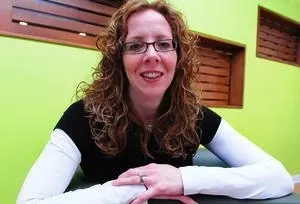
Research Excellence Award Lecture by world-class scholar

But then a small pang of panic set in.
“Like many other researchers who have been affected by the pandemic, my work has been slightly derailed in the past year,” said Wilson.
However, with some solid encouragement from a colleague, she was back on track to provide an overview of the evolution of her nearly two decades worth of research in UTM’s Department of Geography, Geomatics and Environment that included her critical contributions to Indigenous health and immigration studies in Canada, as well as her global impact in the area of health geography.
Wilson, who is also currently UTM’s Vice-Dean, Faculty, started looking at Indigenous health when she first embarked on her academic career, however it was more of a critique of prior work related to social determinants of health that she says did not provide personal perspectives.
“It was really research about rather than for or with Indigenous peoples,” said Wilson.
“From a geographic perspective, previous studies overlooked the importance of urban spaces and places, so the work I started to do throughout my PhD and early career sought to draw attention to the health of urban Indigenous peoples, but also to question and challenge existing frameworks of health for their failure to adequately engage with Indigenous knowledge.”
Wilson thought she would continue to focus on this line of inquiry for the rest of her career, however she credits Professors Ulrich (Ulli) Krull from UTM’s Department of Chemical & Physical Sciences and Ian Orchard from Biology with adding a new direction to her work: along with the city of Mississauga, they helped establish the Healthy City Stewardship Centre (HCSC) in 2004, which leverages Peel region as the location for relevant community-based and local research.
She explained that Mississauga was early to the table when the World Health Organization (WHO) created the Kobe Centre for Health Development (WKC) and Cities and Health Research Program (CHP) in 1996.
“Led by [former] mayor Hazel McCallion at the time, there have been a lot of people at UTM involved in this initiative, including Professor Anthony Wensley in ICCIT who raised it with Hazel when he bumped into her at an airport, but certainly through the vision of Ulli and Ian, working with the city they came up with this partnership framework known as the ‘Mississauga model,’ which bridges the gap between research and policy at the local level by creating these collaborative relationships among municipal governments, research institutions, and community groups.”
A model that Wilson says was adopted by WHO as a template to follow for the CHP, and is the framework she has used now throughout her program of research.
The HCSC unites key decisionmakers on a number of levels, including in the city and across the Peel region, with the betterment of health as a key goal, and continues to factor in to the university’s and the Greater Toronto Area (GTA) priorities to this day.
“The vision and partnerships that UTM spearheaded over a decade ago now, has allowed me to link to a number of community partners over the years,” said Wilson, who has served on related advisory boards and established several long-standing mutually beneficial collaborations.
Wilson said that her focus on immigrant health and settlement and being based in Peel provides a thriving multicultural environment for her work with approximately 382,000 immigrants based in Mississauga alone.
Her data has shown that though immigrants arrive to Canada in good health, their health declines soon after they arrive. As a health geographer, one of her primary interests is how place shapes health and what contributes to this decline including what is known as “geographies of exclusion,” such as economic barriers like income and employment, as well as social exclusions whereby certain groups do not feel welcome in an area. These factors can have a number of negative impacts on individuals as well as a trickle-down adverse effect on other family members.
“It’s an incredibly important and timely issue for local organizations” said Wilson, who has ongoing collaborations with researchers at Waterloo and Ryerson.
“My partners and I talk a lot about how we can look at settlement and health in a way that promotes equity and diversity, and how to build more inclusive communities, as well as how we can improve health and well-being of newcomer populations to the GTA and Peel regions.”
After Wilson’s talk concluded for the roughly 70 participants who Zoomed in for the celebration of her work, Professor Elspeth Brown, UTM’s new Associate Vice-Principal Research led the assembled for a round of unmuted applause and expressed her appreciation for the talk presented before moving on to questions from attendees.
“We are interacting more these days a lot as administrators, but we are also researchers,” said Brown.
“It was so wonderful to hear about your work, Kathi, and I am reflecting on what a perfect choice you are for this particular award, which of course is named after Desmond Morton, someone who was very engaged with research and wider communities.”
The Desmond Morton Research Excellence Award annually recognizes outstanding career achievement in research and scholarly activity by faculty members of the University of Toronto Mississauga. The call is now open for submissions for this year’s award for an exceptional researcher in the humanities.
See the Office of Vice-Principal Research site for more information.
